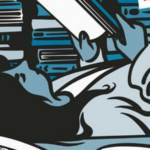There was the time I was in the hospital and my dad called to tell me that he’d just spoken with the sheriff of Desolation Valley; unbeknownst to us, my sister was missing—one of several backpackers who’d gotten waylaid by a snow storm in the Sierra Nevada.
There was the time my family went backpacking in the Grand Canyon and for a period of hours we were each alone in the dark; my sister and I spent the night together, clueless as to where our parents were.
There was the time my sister and I went camping in the Finger Lakes at the tail end of hurricane Ike; we laugh about it now, but it was a harrowing night in a tiny tent with constant ferocious winds.
There was the time when, as a toddler, I fell in a creek and floated downstream while my oblivious parents set up our tent; after the neighboring campers fished me out and carried me back for the third time my parents realized they needed to keep a better eye on me.
Any one of these could be the basis of a chilling story, yet in many ways they were the best times I had with my family—in spite of things going awry. Being in nature was the one place where I was nothing more and nothing less than myself. For all the ways that the wilderness can be beautiful, even threatening, I first think of it as magical because of how it feels to leave behind our dysfunctional imperfections and focus on the elemental task of surviving, and being.
There is a sense of heightened stakes when one is outside for an extended period: What if it doesn’t stop raining and our bedding/food gets wet? What if we run out of fill-in-the-blank? What if someone falls/gets lost/gets bitten by a snake? So maybe it isn’t surprising that nature, and real incidents, sometimes play a role in my suspense novels. For GETAWAY I drew on a piece of Grand Canyon family lore:
We were setting up camp in a remote inner canyon called Salt, where one party at a time was permitted to camp. I was in my teens, and in my creatively-charged memory of it a haggard fellow appeared out of nowhere, wearing a pistol in a hip holster. In fact, he didn’t have a gun, but he mentioned that he’d recently gotten out of prison and was “wandering around.” He also casually remarked that, upon crossing paths with a lone female ranger, he’d realized how easy it would’ve been to pick up a rock and bash her in the head. At that point my dad started glancing around for just such a rock, in case he needed a weapon.
The man trekked on soon after, but this incident at Salt stuck with me over the years; it was the first time that being in nature came with a potential human threat. Is that why it became the springboard for a novel instead of the other misadventures? For me, the answer speaks to how I “find” a novel-worthy premise, as well as the motivation behind my creative process.
For me, inspiration isn’t quite as reliable and glamorous as many may think, and certain concepts lend themselves to better “what ifs” than others. In this instance: What if the man hadn’t walked away? Other ideas can seem immediately compelling, until you realize there just isn’t enough of the good stuff to sustain a long work of fiction. Prior to starting GETAWAY I’d toyed with the possibility of a more traditional campground setting. But soon my brainstorming led me to conclude that if someone encountered trouble at a campground, it would be pretty easy to run back to the car and drive away. The conflict that sustains a novel has to be hard to resolve, and hard in multiple ways. The Grand Canyon as a place is inherently challenging because you’re cut off from the world, and even the basic act of walking is harder than usual. Any kind of emergency that happens there could have extreme consequences.
Another piece of the puzzle that’s vital to me is the protagonist’s journey. I would describe all of my novels as psychological suspense, no matter what others may call them—horror, thriller, creepy, f*cked up. My interest is in creating characters who realistically confront and process some sort of extraordinary situation. I want them to experience the entire, weird problem—physically, emotionally, spiritually—and examine how their life brought them to that moment, and hint at where it might go if they survive.
This desire to see grounded characters grappling with unusual (if not bizarre) scenarios may explain why my books appear to be different genres, but in all instances the backdrop is intrinsic to the psychological deep dive that unfolds. In this way I find novel-worthy concepts at the intersection of a specific location, an out-of-the-ordinary set of problems, and a protagonist who is able to self-reflect as part of her survival strategy. Does that make my fiction a little more introspective? Perhaps. But I believe that those internal fears—the origins of so many character flaws—can add as much suspense to the page as external threats. And I love setting up a premise that allows me to tackle both.
There was the time my dad nearly fell off a cliff, and the Canyon trip where I crossed paths with three rattlesnakes. My sister has almost too many close calls to recount.
You might think these tales would leave us afraid of the outdoors, but that couldn’t be further from the truth. There’s something incredibly life-affirming about prevailing through a difficult, even a dangerous, event. They become the indelible memories, the tales that define you. A novel is meant to explore a defining moment in a character’s life, which makes a writer’s real experiences—mixed with a hearty dose of imagination—a dynamic path for creating a story like GETAWAY.
***


















